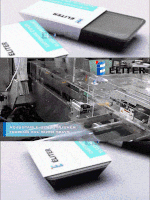Transforming Beverage Packaging: Innovations in Packaging Machines
2024-02-14
In the vast and varied world of beverages—from sparkling sodas and robust beers to the ubiquitous presence of brands like Coca-Cola—packaging not only serves as a protective barrier but also as a medium of brand identity and consumer connection. Beverage packaging machines play a pivotal role in this process, embodying the intersection of technology, sustainability, and consumer trends. This article delves into the technological advancements, operational efficiencies, and future directions of beverage packaging machines, highlighting their critical role in the beverage industry.

The Technological Core of Beverage Packaging
Beverage packaging machines are at the heart of the production line, designed to fill, seal, label, and package liquids with precision and speed. These machines cater to a broad spectrum of beverage types, accommodating the unique requirements of carbonated drinks, alcoholic beverages, juices, and water.

Key Machine Types in Beverage Packaging
- Filling Machines: From gravity fillers to vacuum fillers, these machines ensure accurate and efficient filling of beverages into bottles, cans, or pouches, maintaining product integrity and taste.
- Sealing/Capping Machines: Essential for securing the beverage within its container, sealing machines apply caps, corks, or can lids, preventing contamination and preserving carbonation in sodas and beers.
- Labeling Machines: Automating the application of labels, these machines support branding efforts, providing consumers with product information and adhering to regulatory labeling requirements.
- Packing/Case Packing Machines: These systems organize individual units into multipacks or cases, readying them for distribution and retail display.

Operational Excellence and Integration
Achieving efficiency in beverage packaging involves more than just the speed of individual machines; it requires seamless integration within the production line. Advanced beverage packaging machines feature modular designs and are often equipped with smart sensors and control systems that enable real-time adjustments, minimizing downtime and maximizing throughput.
Challenges and Solutions
- Handling Diverse Packaging Materials: Modern machines are versatile, capable of working with glass, plastic, metal, and composite materials, ensuring broad applicability across beverage types.
- Maintaining Beverage Quality: Packaging machines are designed to operate in sterile environments, using techniques like HEPA filtration and UV sterilization to ensure the safety and quality of the beverage product.
Trends Shaping the Future of Beverage Packaging Machines
Sustainability at the Forefront
The push towards eco-friendly packaging solutions has led to significant innovations in machine design and operation. Beverage packaging machines are increasingly compatible with biodegradable materials, lightweight packaging designs, and energy-efficient operations, reducing the environmental impact of packaging processes.

Smart and Interactive Packaging
Emerging technologies enable beverage brands to engage consumers through smart packaging. Machines that incorporate QR codes, NFC tags, and augmented reality features into packaging designs are becoming more prevalent, offering consumers enhanced brand experiences and product traceability.
Personalization and Flexibility
As consumer demand for personalized products grows, beverage packaging machines are evolving to offer greater flexibility. Digital printing technology allows for on-the-fly customization of labels and packaging, enabling small batch runs and limited edition releases without significant setup changes or downtime.
The Future is Now: Beverage Packaging Innovations
The future of beverage packaging machines is characterized by continuous innovation, with a focus on sustainability, digital integration, and operational efficiency. As the industry moves towards more sustainable practices, machines that can handle alternative packaging materials and formats while minimizing waste and energy consumption will become standard. Additionally, the integration of Internet of Things (IoT) technology will enhance predictive maintenance capabilities, reducing downtime and extending the lifespan of machinery.
Conclusion
Beverage packaging machines are more than just the sum of their parts; they are a dynamic element of the beverage industry’s value chain, critical for ensuring product quality, meeting consumer expectations, and achieving sustainability goals. As technological advancements continue to unfold, these machines will not only transform the way beverages are packaged but also how they are experienced by consumers worldwide. In navigating the future of the beverage industry, packaging machines will undoubtedly play a leading role, driving innovation and shaping consumer trends for years to come.




